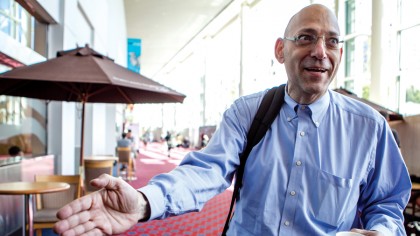Up close with computer programmer Robert 'r0ml' Lefkowitz
The renaissance man
LXF: It's the concepts, conditional statements, the effort of constructing a solution to a problem that stays with you. This is what non-programmers are missing. It's the demystification of the process that means a lot of people go through the world thinking computers are magic. How do we tackle that?
RL: I certainly think it's a more conceptual kind of education. I had set out about a year ago to write a book on this topic. And I had this thesis around what we've just been talking about - around Charlemagne, and this kind of cusp when you make it easy enough, universal literacy, and how universal literacy for computers is sort of analogous to universal phonetic literacy and what should we do to move that forward.
But doing my research, my thinking evolved. I came across some other interesting stuff that I read which made my thinking evolve to the point where I don't believe my thesis holds water!
LXF: What about the book!
RL: There's still going to be a book! But I'll delay the schedule now because what I have to do is think about it some more and come up with a new thesis that I think holds water better, and that would be more effective. Fundamentally, the idea that literacy, from Charlemagne, and sort of subsequent revolutions of it throughout history, there were two main drivers for literacy and education, and literacy and education was all around reading.
The reason it was all around reading was for these two societal myths; the first one was the Christian myth: in order to know the word of God you had to read the word of God. To read was to become better. You read in order to become good, and that was kind of the societal driving force. If it's going to make people better then obviously everyone should listen.
And then the second myth, for us in colonial America, but also throughout the world, in order to have an effective democratic society, or any society, you need an informed citizenry. We felt we needed this because they needed to vote. In the non-democratic societies you needed to have an informed citizenry because they needed to know which laws to obey without getting in trouble. But in order to have an informed citizenry they needed to know how to read, and therefore, you have to teach them all how to read. Ta da! Because it will make them better citizens.
Get daily insight, inspiration and deals in your inbox
Sign up for breaking news, reviews, opinion, top tech deals, and more.
Reading, is in Deborah Brandt's [professor emerita of English at the University of Wisconsin-Madison] words, 'for good' not 'a good'. Writing, however, was 'a good'. You wrote, and it was a product, and then you could sell it. You didn't improve yourself by writing…
That's the myth. And if you look at computing science in the 1980s, Donald Knuth's Literate Programming, they call talk about 'Yes, you have to write programs that can be readable so that other people can read them'. It's all informed by the underlying cultural sensibility that says 'Oh yes, reading is a good thing'. What I'm saying is something different.
The second piece of the puzzle is the thesis that I'm developing now. In the beginning nobody reads and writes because we haven't invented that stuff, or it exists but it's only for bookkeeping. It doesn't have any societal impact because its all scribes in the royal treasury. Then, and we'll take this from Plato, Socrates believed writing was a bad idea. Plato agrees with Socrates but he writes down The Republic to explain why it's a bad idea.

LXF: We're covering a lot of ground here… from the 1980s to 400BC.